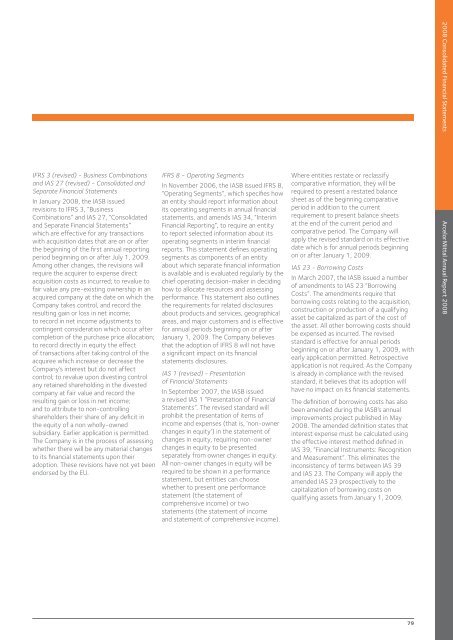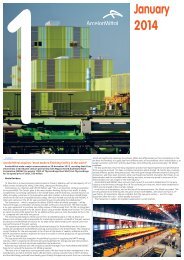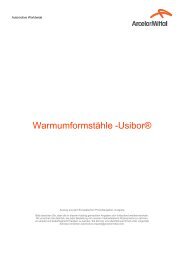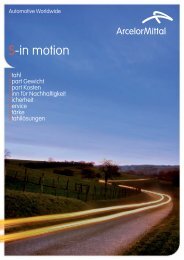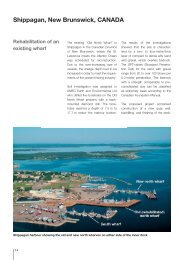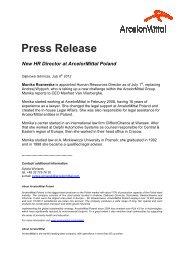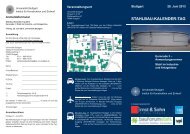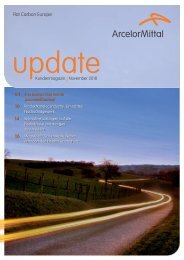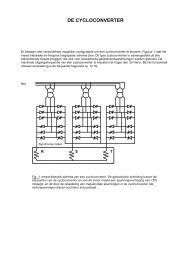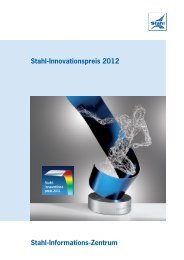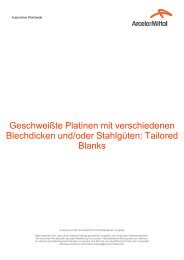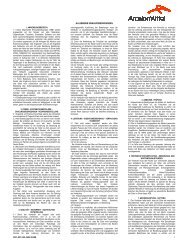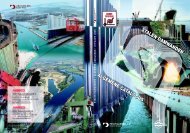ArcelorMittal Annual Report 2008
ArcelorMittal Annual Report 2008
ArcelorMittal Annual Report 2008
You also want an ePaper? Increase the reach of your titles
YUMPU automatically turns print PDFs into web optimized ePapers that Google loves.
IFRS 3 (revised) - Business Combinations<br />
and IAS 27 (revised) - Consolidated and<br />
Separate Financial Statements<br />
In January <strong>2008</strong>, the IASB issued<br />
revisions to IFRS 3, “Business<br />
Combinations” and IAS 27, “Consolidated<br />
and Separate Financial Statements”<br />
which are effective for any transactions<br />
with acquisition dates that are on or after<br />
the beginning of the first annual reporting<br />
period beginning on or after July 1, 2009.<br />
Among other changes, the revisions will<br />
require the acquirer to expense direct<br />
acquisition costs as incurred; to revalue to<br />
fair value any pre-existing ownership in an<br />
acquired company at the date on which the<br />
Company takes control, and record the<br />
resulting gain or loss in net income;<br />
to record in net income adjustments to<br />
contingent consideration which occur after<br />
completion of the purchase price allocation;<br />
to record directly in equity the effect<br />
of transactions after taking control of the<br />
acquiree which increase or decrease the<br />
Company’s interest but do not affect<br />
control; to revalue upon divesting control<br />
any retained shareholding in the divested<br />
company at fair value and record the<br />
resulting gain or loss in net income;<br />
and to attribute to non-controlling<br />
shareholders their share of any deficit in<br />
the equity of a non wholly-owned<br />
subsidiary. Earlier application is permitted.<br />
The Company is in the process of assessing<br />
whether there will be any material changes<br />
to its financial statements upon their<br />
adoption. These revisions have not yet been<br />
endorsed by the EU.<br />
IFRS 8 - Operating Segments<br />
In November 2006, the IASB issued IFRS 8,<br />
“Operating Segments”, which specifies how<br />
an entity should report information about<br />
its operating segments in annual financial<br />
statements, and amends IAS 34, “Interim<br />
Financial <strong>Report</strong>ing”, to require an entity<br />
to report selected information about its<br />
operating segments in interim financial<br />
reports. This statement defines operating<br />
segments as components of an entity<br />
about which separate financial information<br />
is available and is evaluated regularly by the<br />
chief operating decision-maker in deciding<br />
how to allocate resources and assessing<br />
performance. This statement also outlines<br />
the requirements for related disclosures<br />
about products and services, geographical<br />
areas, and major customers and is effective<br />
for annual periods beginning on or after<br />
January 1, 2009. The Company believes<br />
that the adoption of IFRS 8 will not have<br />
a significant impact on its financial<br />
statements disclosures.<br />
IAS 1 (revised) - Presentation<br />
of Financial Statements<br />
In September 2007, the IASB issued<br />
a revised IAS 1 “Presentation of Financial<br />
Statements”. The revised standard will<br />
prohibit the presentation of items of<br />
income and expenses (that is, ‘non-owner<br />
changes in equity’) in the statement of<br />
changes in equity, requiring non-owner<br />
changes in equity to be presented<br />
separately from owner changes in equity.<br />
All non-owner changes in equity will be<br />
required to be shown in a performance<br />
statement, but entities can choose<br />
whether to present one performance<br />
statement (the statement of<br />
comprehensive income) or two<br />
statements (the statement of income<br />
and statement of comprehensive income).<br />
Where entities restate or reclassify<br />
comparative information, they will be<br />
required to present a restated balance<br />
sheet as of the beginning comparative<br />
period in addition to the current<br />
requirement to present balance sheets<br />
at the end of the current period and<br />
comparative period. The Company will<br />
apply the revised standard on its effective<br />
date which is for annual periods beginning<br />
on or after January 1, 2009.<br />
IAS 23 - Borrowing Costs<br />
In March 2007, the IASB issued a number<br />
of amendments to IAS 23 “Borrowing<br />
Costs”. The amendments require that<br />
borrowing costs relating to the acquisition,<br />
construction or production of a qualifying<br />
asset be capitalized as part of the cost of<br />
the asset. All other borrowing costs should<br />
be expensed as incurred. The revised<br />
standard is effective for annual periods<br />
beginning on or after January 1, 2009, with<br />
early application permitted. Retrospective<br />
application is not required. As the Company<br />
is already in compliance with the revised<br />
standard, it believes that its adoption will<br />
have no impact on its financial statements.<br />
The definition of borrowing costs has also<br />
been amended during the IASB’s annual<br />
improvements project published in May<br />
<strong>2008</strong>. The amended definition states that<br />
interest expense must be calculated using<br />
the effective interest method defined in<br />
IAS 39, “Financial Instruments: Recognition<br />
and Measurement”. This eliminates the<br />
inconsistency of terms between IAS 39<br />
and IAS 23. The Company will apply the<br />
amended IAS 23 prospectively to the<br />
capitalization of borrowing costs on<br />
qualifying assets from January 1, 2009.<br />
79<br />
<strong>2008</strong> Consolidated Financial Statements<br />
<strong>ArcelorMittal</strong> <strong>Annual</strong> <strong>Report</strong> <strong>2008</strong>


